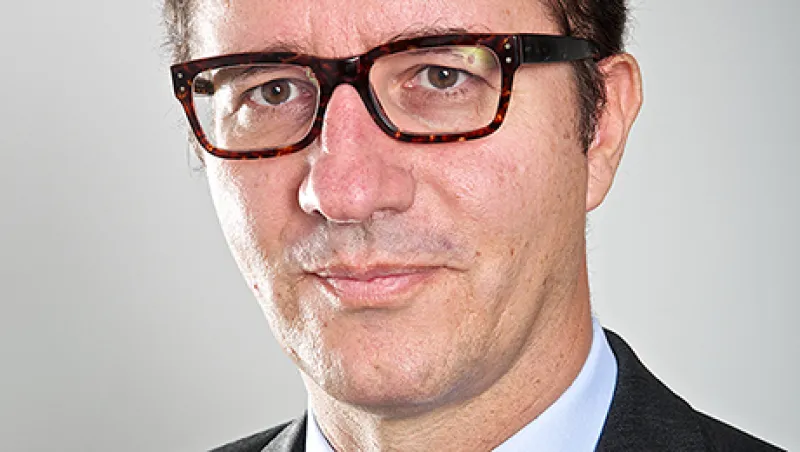Luigi de Vecchi wants to restore Italy to its Renaissance glory. For two years he’s taught mergers and acquisitions and investment banking at his alma mater, Rome’s Libera Università Internazionale degli Studi Sociali (LUISS) Guido Carli, where he sits on the advisory board. His goal: to find the future leaders of Italian industry. But more immediately, de Vecchi aims to establish Citigroup among Europe’s deal-making elite, having joined the U.S. firm as chairman of corporate and investment banking for continental Europe in May 2013.
He’s found early success at Citi, which has been rebuilding its European investment banking business under CEO Michael Corbat. In the first six months of the year, the bank ranked third in European M&A, according to Dealogic, working on 42 deals worth a combined $196.7 billion. That’s a surge of almost 340 percent over its eighth-place finish in the first half of 2013, when it advised on 43 transactions with a total value of $44.9 billion. De Vecchi, 49, is based in Milan, where he’s working to boost Citi’s Italian presence amid signs of revitalized capital markets and M&A activity. “Privatizations are back, big corporates have resumed deal-making, and the banking sector is being recapitalized and on the verge of a wave of consolidation,” he says of Italy.
Since he arrived, Citi has won a mandate as joint global coordinator on the Italian government’s planned initial public offering of a 40 percent stake in Poste Italiane; expected next year, the flotation could be worth upward of €5 billion ($6.6 billion). De Vecchi has advised GTECH, the Rome-based gaming company, on its pending acquisition of U.S. slot machine maker International Game Technology for $6.4 billion, and long-standing client Telecom Italia on the forthcoming $1 billion sale of its Argentinian business to Fintech Group, the firm founded by Mexican financier David Martínez Guzmán. The banker is also counseling Alitalia on a proposed rescue deal that would see the United Arab Emirates’ Etihad Airways buy 49 percent of the money-losing Italian airline for €1.76 billion.
But his role in helping Martínez buy a stake in troubled lender Banca Monte dei Paschi di Siena has attracted the most attention. MPS, Italy’s oldest and third-largest bank, must raise €5 billion this year in return for receiving €4.1 billion in Italian state bailout bonds. On March 31 top shareholder Fondazione MPS, which originally held 12 percent of all shares, announced that it had sold a 6.5 percent position to Fintech and Brazilian bank BTG Pactual as part of a pact to jointly control MPS.
After earning an MA in business and economics from LUISS in his native Rome, de Vecchi began his career in London in 1987 as an intern in the commercial banking division of Banque Nationale de Paris. “When I found out the person opposite me had been sitting at the same desk for 32 years, I didn’t sleep for two weeks,” he jokes. “I knew I needed to move on.” That year he defected to British merchant bank Kleinwort Benson as an analyst. Kleinwort’s experience as the leading bank on U.K. privatizations caught the eye of the Italian government when it began its own such program in 1989. Put in charge of this new initiative by his firm, de Vecchi worked with Mario Draghi, then director general of the Department of Treasury.
Promoted to managing director in 1992, he moved to Rio de Janeiro three years later to launch a Kleinwort division. In 1998, Goldman Sachs Group hired him to run its Brazilian business. But after Brazil crashed in the wake of the Asian financial crisis, de Vecchi took a post in New York as a managing director with the firm’s technology, media and telecom practice. Then, in 2002, new Goldman partner Draghi enlisted him as his Italian lieutenant. The pair helped reestablish Goldman as a leading player in that country before Draghi, now head of the European Central Bank, left to run the Bank of Italy in 2003.
De Vecchi joined Credit Suisse as head of investment banking for Italy in 2004, rising to global co-head. In 2011 he advised Italian luxury goods maker Bulgari on its €3.7 billion sale to French counterpart LVMH Moët Hennessy. “We achieved a 60 percent premium, and the deal was struck at four times sales, which was an exceptional deal,” says then–Bulgari CEO Francesco Trapani, now a senior adviser to LVMH chairman and CEO Bernard Arnault.
In early 2012 de Vecchi took a sabbatical from Credit Suisse; besides teaching in Rome, he joined the advisory board of the California Institute of the Arts. “While the arts and economics are different parts of the brain, there is no reason why they can’t co-exist,” he says. “That is what was so compelling about the Renaissance.”
Italy is the biggest debt market in Europe and the euro zone’s third-largest investment banking fee pool after Germany and France, de Vecchi notes. “Citi has great potential there because its corporate bank is the bank’s heart and has been doing business with clients there for over 100 years,” he says. “This is a rare breed: a universal bank where relationships still matter.” • •






